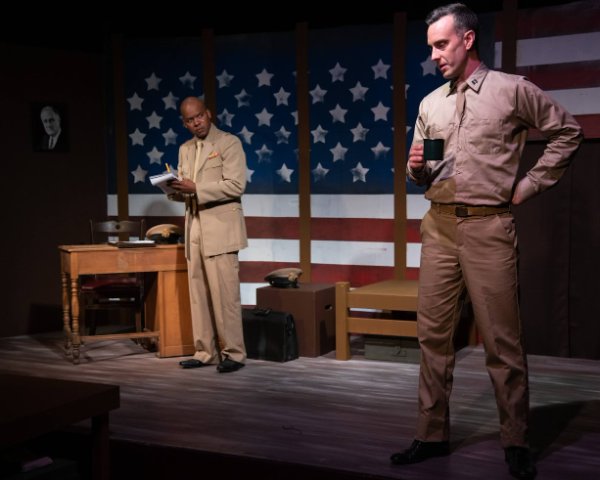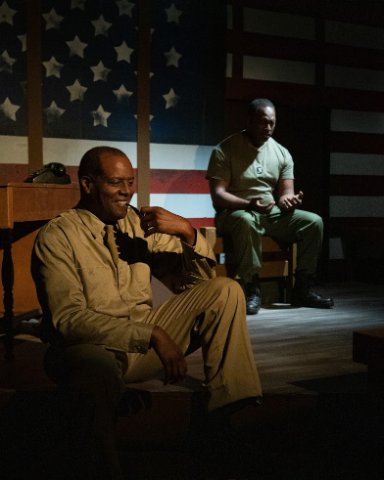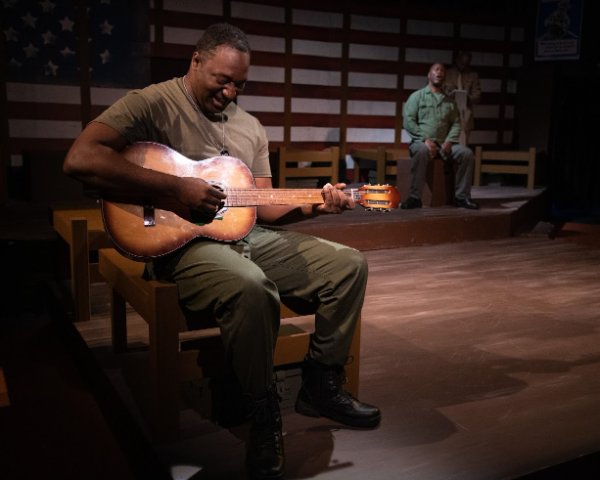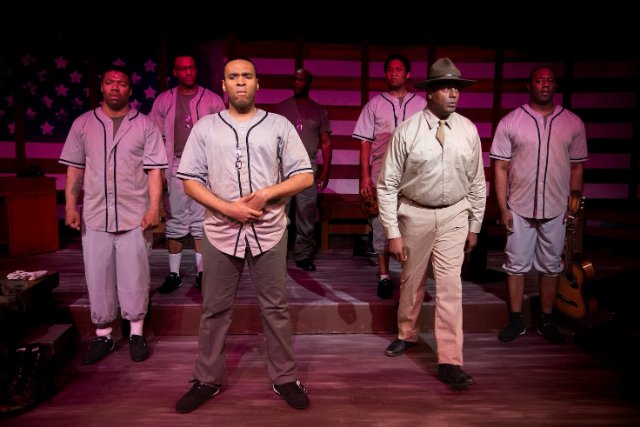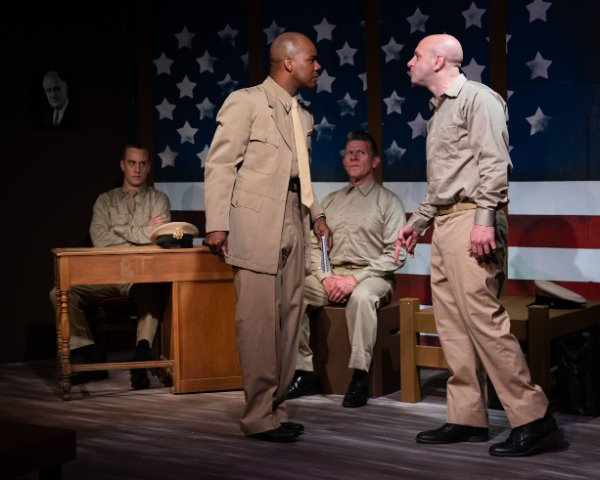A Soldier's Play
Murder, Mystery, and Racism on the Home Front During World War II
By: Victor Cordell - Jun 05, 2023
One of the great breakthrough films of 1984 was “A Soldier’s Story,” a mystery centered on the murder of an African-American sergeant in a segregated unit at an Army base in Louisiana during World War II. Less known to the general public is its source material, Charles Fuller’s “A Soldier’s Play,” winner of the 1982 Pulitzer Prize for Drama. Not as expansive as the movie, the taut play exudes racial conflict throughout. Altarena Playhouse captures the gripping tension with a laudable production.
In 1944, African-American military units were always commanded by white officers, with black non-coms, and enlisted men, reflecting the plantation structure that preceded it by a century and more. This organization represents the natural order to Captain Charles Taylor, a West Point grad, who happily manages and cajoles a platoon comprised of talented black baseball players who will get to play the Yankees if they continue to win all of their games. To this day, a common condition persists, that racists like Taylor often carve out exceptions to allow minority peoples to reflect glory on their white overlords.
An investigation is ordered to find the killer of the black Sergeant Vernon Waters. His commanding officer, Taylor, is shocked that one of the rare black officers in the military, Captain Richard Davenport, is brought in from another base and tasked. In another racial behavioral cliché, Taylor retains civility when Davenport arrives, yet dismisses his legitimacy and the very notion of a black officer. He insists that not only will Davenport fail, but that he’s being set up to fail. Between the legal and social impediments that the black officer faces, he won’t be able to charge a white man for the murder, just what the senior officers on the base hope for. Indeed, the natural suspects would be off-base locals, especially the Ku Klux Klan, or white Army officers.
The action shifts easily from present to past in numerous flashbacks, and we meet the platoon’s men as they interact and are individually interrogated by Davenport. The distinctive element of the play is that it plumbs intra-racial prejudice as well, and that the antagonist is a black man. The bunkhouse friction derives from Sergeant Waters, a by-the-book authoritarian who derisively refers to all southern blacks, of which there are several in the platoon, as Geechees. He largely defends the bigotry of white people, as he blames the southern blacks for being lazy and shiftless and setting poor examples for the black race. Meanwhile, the men try to maintain cohesion and hope to get deployed to enter the war as a fighting unit.
“A Soldier’s Play” is designed for actors, with a large ensemble of speaking parts. Overall, the cast rises to the occasion with several sharp performances. The black captain, played by Dedrick Weathersby, and the white captain, played by Drew Paton, aptly convey their ramrod appearances and behaviors and their uneasy ceasefire throughout. Though they are peers in rank, Weathersby uses his character’s authority granted to lead the investigation as a bludgeon to fend off the white officer’s intrusions and insults. Meanwhile, Paton’s character persists at interfering, obliging only when necessary. They stand as two opposing sentinels, a pace apart physically, but light years apart on every social and emotional dimension.
The pivotal and most divisive character, Sergeant Waters, denigrates and punishes blacks who don’t submit to his demands. Although Fred Pitts is talented and acts admirably, his performance doesn’t exploit Water’s vengeful imperiousness to make him sufficiently despicable. Among other deeds, he had unnecessarily reported James Wilkie, a “lifer” like himself but also a "Geechee," for drinking while on guard duty and had him busted from sergeant to private. Wilkie, who must first satisfy Waters in hopes of getting his stripes back, is well acted by Hosea Morgan in an excitable and obsequious manner. Another "Geechee" to suffer Waters's abuse is C. J. Memphis. Tory Williams is the incarnation of Memphis with his slow talking, easy going, big teddy bear way. One hitch is that Memphis is supposed to be a competent guitar player, and Williams strums a single chord when he sings.
With many shifts in time and characters from one scene to another, the narrative and ShawnJ West’s direction maintain a brisk pace and keep the audience well engaged. In many ways, “A Soldier’s Play” is like a police procedural but with added elements of historical and social significance. Unfortunately, the racial battles rage on, so the story's poignancy has not diminished.
“A Soldier’s Play,” written by Charles Fuller, is produced by Altarena Playhouse and plays on its stage at 1409 High Street, Alameda, CA through June 25, 2023.

